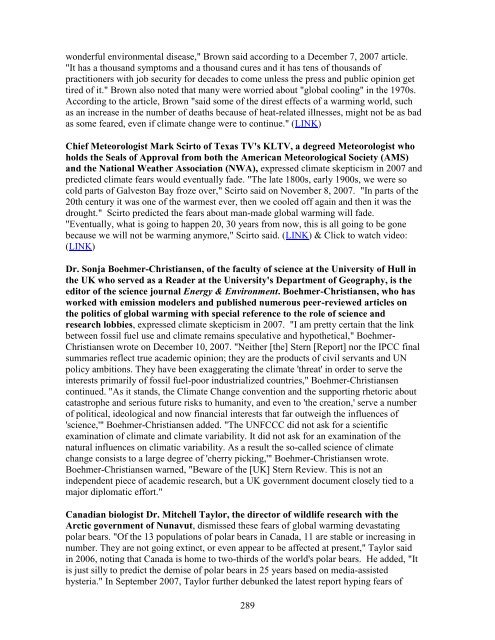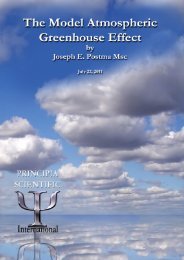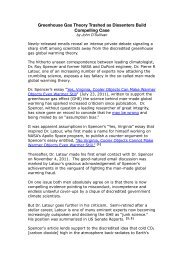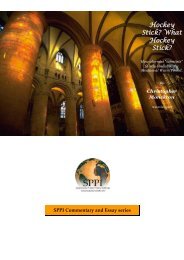Than 1000 International Scientists Dissent Over Man-Made Global ...
Than 1000 International Scientists Dissent Over Man-Made Global ...
Than 1000 International Scientists Dissent Over Man-Made Global ...
Create successful ePaper yourself
Turn your PDF publications into a flip-book with our unique Google optimized e-Paper software.
wonderful environmental disease," Brown said according to a December 7, 2007 article.<br />
"It has a thousand symptoms and a thousand cures and it has tens of thousands of<br />
practitioners with job security for decades to come unless the press and public opinion get<br />
tired of it." Brown also noted that many were worried about "global cooling" in the 1970s.<br />
According to the article, Brown "said some of the direst effects of a warming world, such<br />
as an increase in the number of deaths because of heat-related illnesses, might not be as bad<br />
as some feared, even if climate change were to continue." (LINK)<br />
Chief Meteorologist Mark Scirto of Texas TV's KLTV, a degreed Meteorologist who<br />
holds the Seals of Approval from both the American Meteorological Society (AMS)<br />
and the National Weather Association (NWA), expressed climate skepticism in 2007 and<br />
predicted climate fears would eventually fade. "The late 1800s, early 1900s, we were so<br />
cold parts of Galveston Bay froze over," Scirto said on November 8, 2007. "In parts of the<br />
20th century it was one of the warmest ever, then we cooled off again and then it was the<br />
drought." Scirto predicted the fears about man-made global warming will fade.<br />
"Eventually, what is going to happen 20, 30 years from now, this is all going to be gone<br />
because we will not be warming anymore," Scirto said. (LINK) & Click to watch video:<br />
(LINK)<br />
Dr. Sonja Boehmer-Christiansen, of the faculty of science at the University of Hull in<br />
the UK who served as a Reader at the University's Department of Geography, is the<br />
editor of the science journal Energy & Environment. Boehmer-Christiansen, who has<br />
worked with emission modelers and published numerous peer-reviewed articles on<br />
the politics of global warming with special reference to the role of science and<br />
research lobbies, expressed climate skepticism in 2007. "I am pretty certain that the link<br />
between fossil fuel use and climate remains speculative and hypothetical," Boehmer-<br />
Christiansen wrote on December 10, 2007. "Neither [the] Stern [Report] nor the IPCC final<br />
summaries reflect true academic opinion; they are the products of civil servants and UN<br />
policy ambitions. They have been exaggerating the climate 'threat' in order to serve the<br />
interests primarily of fossil fuel-poor industrialized countries," Boehmer-Christiansen<br />
continued. "As it stands, the Climate Change convention and the supporting rhetoric about<br />
catastrophe and serious future risks to humanity, and even to 'the creation,' serve a number<br />
of political, ideological and now financial interests that far outweigh the influences of<br />
'science,'" Boehmer-Christiansen added. "The UNFCCC did not ask for a scientific<br />
examination of climate and climate variability. It did not ask for an examination of the<br />
natural influences on climatic variability. As a result the so-called science of climate<br />
change consists to a large degree of 'cherry picking,'" Boehmer-Christiansen wrote.<br />
Boehmer-Christiansen warned, "Beware of the [UK] Stern Review. This is not an<br />
independent piece of academic research, but a UK government document closely tied to a<br />
major diplomatic effort."<br />
Canadian biologist Dr. Mitchell Taylor, the director of wildlife research with the<br />
Arctic government of Nunavut, dismissed these fears of global warming devastating<br />
polar bears. "Of the 13 populations of polar bears in Canada, 11 are stable or increasing in<br />
number. They are not going extinct, or even appear to be affected at present," Taylor said<br />
in 2006, noting that Canada is home to two-thirds of the world's polar bears. He added, "It<br />
is just silly to predict the demise of polar bears in 25 years based on media-assisted<br />
hysteria." In September 2007, Taylor further debunked the latest report hyping fears of<br />
289





